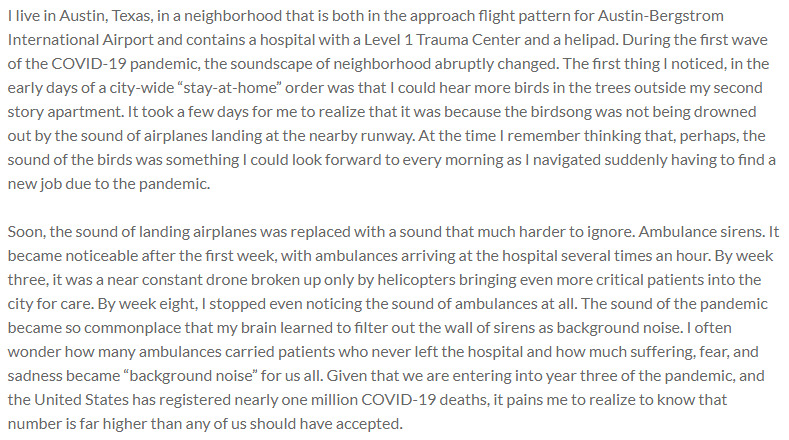Item
An Unacceptable Wall of Sound
Title (Dublin Core)
An Unacceptable Wall of Sound
Disclaimer (Dublin Core)
DISCLAIMER: This item may have been submitted in response to a school assignment prompt. See Linked Data.
Description (Dublin Core)
I live in Austin, Texas, in a neighborhood that is both in the approach flight pattern for Austin-Bergstrom International Airport and contains a hospital with a Level 1 Trauma Center and a helipad. During the first wave of the COVID-19 pandemic, the soundscape of neighborhood abruptly changed. The first thing I noticed, in the early days of a city-wide “stay-at-home” order was that I could hear more birds in the trees outside my second story apartment. It took a few days for me to realize that it was because the birdsong was not being drowned out by the sound of airplanes landing at the nearby runway. At the time I remember thinking that, perhaps, the sound of the birds was something I could look forward to every morning as I navigated suddenly having to find a new job due to the pandemic.
Soon, the sound of landing airplanes was replaced with a sound that much harder to ignore. Ambulance sirens. It became noticeable after the first week, with ambulances arriving at the hospital several times an hour. By week three, it was a near constant drone broken up only by helicopters bringing even more critical patients into the city for care. By week eight, I stopped even noticing the sound of ambulances at all. The sound of the pandemic became so commonplace that my brain learned to filter out the wall of sirens as background noise. I often wonder how many ambulances carried patients who never left the hospital and how much suffering, fear, and sadness became “background noise” for us all. Given that we are entering into year three of the pandemic, and the United States has registered nearly one million COVID-19 deaths, it pains me to realize to know that number is far higher than any of us should have accepted.
Soon, the sound of landing airplanes was replaced with a sound that much harder to ignore. Ambulance sirens. It became noticeable after the first week, with ambulances arriving at the hospital several times an hour. By week three, it was a near constant drone broken up only by helicopters bringing even more critical patients into the city for care. By week eight, I stopped even noticing the sound of ambulances at all. The sound of the pandemic became so commonplace that my brain learned to filter out the wall of sirens as background noise. I often wonder how many ambulances carried patients who never left the hospital and how much suffering, fear, and sadness became “background noise” for us all. Given that we are entering into year three of the pandemic, and the United States has registered nearly one million COVID-19 deaths, it pains me to realize to know that number is far higher than any of us should have accepted.
Date (Dublin Core)
Creator (Dublin Core)
Contributor (Dublin Core)
Event Identifier (Dublin Core)
HST643
Partner (Dublin Core)
Type (Dublin Core)
text story
Controlled Vocabulary (Dublin Core)
Curator's Tags (Omeka Classic)
Contributor's Tags (a true folksonomy) (Friend of a Friend)
Sensory History
sound
airplane
ambulance
Linked Data (Dublin Core)
Date Submitted (Dublin Core)
02/04/2022
Date Modified (Dublin Core)
03/16/2022
06/10/2022
Item sets
This item was submitted on February 4, 2022 by Amy Evenson using the form “Share Your Story” on the site “A Journal of the Plague Year”: http://mail.covid-19archive.org/s/archive
Click here to view the collected data.

